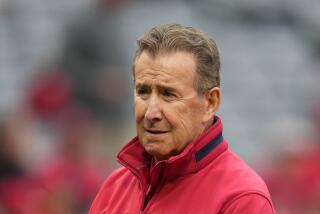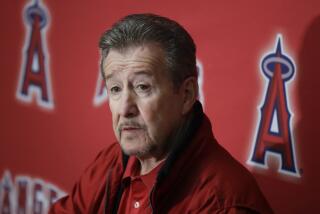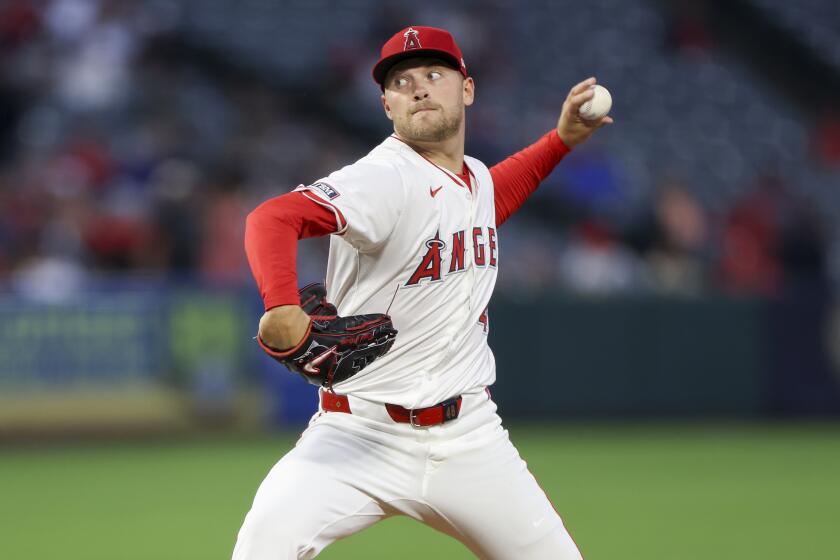Don’t Tread on Angel Trademark
In San Antonio, David Robinson’s legacy extends beyond the basketball court, a few blocks beyond the Alamodome, to 217 Robinson Place. That’s the address for the Carver Academy, the nonprofit elementary school founded by Robinson so underprivileged children in his adopted hometown could enjoy a first-class education.
Robinson, the retired NBA superstar, named the private school in honor of George Washington Carver, the noted educator, inventor and scientist.
“That’s the kind of wonder I want to inspire in the kids,” Robinson said.
The Carver Academy opened in 2001, enrollment has doubled since then, and an endowment campaign is underway. But lawyers representing the school are busy fighting lawyers representing the Angels. The lawyers contend the academy’s interlocking CA logo might confuse or deceive people into believing the team is associated with the school -- even though the team has not used such a logo in nine years.
Tom Stolpman, who owns a boutique winery in the Santa Ynez Valley, is waging a similar battle. When he applied for a trademark for a brand labeled “Gli Angeli” -- “The Angels” in Italian -- the Angels objected.
Although Angel owner Arte Moreno picked a legal fight with the city of Anaheim by slapping a Los Angeles label on his team, he isn’t instigating these trademark fights.
The cases nonetheless illustrate the challenge major league teams face in protecting their rights to names, logos and designs. Although the Angels are listed as the party objecting in the Carver and Stolpman cases, the New York law firm that filed the objections is retained not by the team but by Major League Baseball.
The lawyers and executives working on baseball trademark issues handle “hundreds of active matters at any given time,” said Ethan Orlinsky, senior vice president and general counsel of MLB Properties. The owner of a trademark must enforce it or risk losing it, he said.
In the Carver case, the Angels say they have the right to approve use of their names and logos in connection with “educational services.” Although Carver’s interlocking CA resembles the Angels’ logo from 1993 to 1996, when they played as the California Angels, the academy uses different colors and does not include a halo.
That the Angels no longer use that logo is not necessarily relevant, Orlinsky said, because major league officials still license old logos.
“We license the Brooklyn Dodgers on behalf of the Los Angeles Dodgers,” he said.
Although both cases are pending before the U.S. Patent and Trademark Office, lawyers have filed papers putting the cases on hold so settlement options can be explored. More than 95% of trademark cases eventually settle, said Stolpman and his trademark lawyer, David Grace.
Although the Angel lawyers filed their objection in the Carver case last November, Robinson said he was unaware of the trademark dispute. The lawyer who last filed on behalf of the academy, Kristi Nickel, declined to comment.
However, Robinson said he would be happy to speak with Moreno in the hope of settling the matter.
“If it were that simple, sure,” Robinson said.
“This should be no conflict at all. I’m surprised it would become such a thing.”
Moreno said he was unaware of either the Carver or Stolpman cases but said he did not see a problem with either use. He would leave trademark law to the MLB trademark lawyers, he said, but he chuckled at the apparent irrationality of it all.
“It would be like us going to the Crystal Cathedral,” he said, “and saying you can’t talk about the angels.”
More to Read
Go beyond the scoreboard
Get the latest on L.A.'s teams in the daily Sports Report newsletter.
You may occasionally receive promotional content from the Los Angeles Times.










